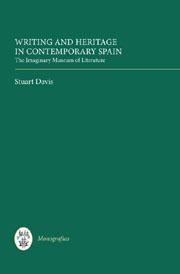Book contents
- Frontmatter
- Contents
- Acknowledgements
- Introduction
- 1 Presenting the Museum
- 2 Never-ending Story: Canon Fever
- 3 Working Models, Model (Re)Workings: Goytisolo and Cervantes
- 4 The Authoritative Gaze: Cristina Peri Rossi
- 5 Generations Apart? The ‘Generation X’ in Spanish Literature
- Conclusion: What do we do with the Gifts of the Past?
- Works Cited
- Index
1 - Presenting the Museum
Published online by Cambridge University Press: 05 February 2013
- Frontmatter
- Contents
- Acknowledgements
- Introduction
- 1 Presenting the Museum
- 2 Never-ending Story: Canon Fever
- 3 Working Models, Model (Re)Workings: Goytisolo and Cervantes
- 4 The Authoritative Gaze: Cristina Peri Rossi
- 5 Generations Apart? The ‘Generation X’ in Spanish Literature
- Conclusion: What do we do with the Gifts of the Past?
- Works Cited
- Index
Summary
A Museum and a Free Library are as necessary for the mental and moral health of the citizens as good sanitary arrangements, water supply and street lighting are for their physical health and comfort. Thomas Greenwood
Al Museo fueron alguna vez. Felipe, con la boca abierta, miraba aquellas figuras tan guapas, y tenía como una sospecha del gran mérito de todas ellas. En presencia de la perfección artística, no hay persona, por ruda, por ineducada que sea, que no sienta, ya que no otra cosa, el secreto orgullo de su afinidad con la esencia divina que inspiró aquella belleza y de su parentesco corpóreo con las manos que la ejecutaron.
Benito Pérez GaldósThe early museum
The essence of the museum lies in a number of qualities. Museums have a rich and varied history, and indeed still now encompass a wide range of areas of knowledge and uses. The museum's function, as designated by the International Council of Museums/Conseil International des Musées, is as ‘a non-profit, permanent institution in the service of society and its development, open to the public, which acquires, conserves, researches, communicates and exhibits the tangible and intangible heritage of humanity and its environment for the purposes of education, study and enjoyment’. As Donald Prezoisi points out, anything (tangible or intangible, it seems) can be in a museum, it is simply a question of ‘when’ rather than ‘what’.
- Type
- Chapter
- Information
- Writing and Heritage in Contemporary SpainThe Imaginary Museum of Literature, pp. 11 - 47Publisher: Boydell & BrewerPrint publication year: 2012



